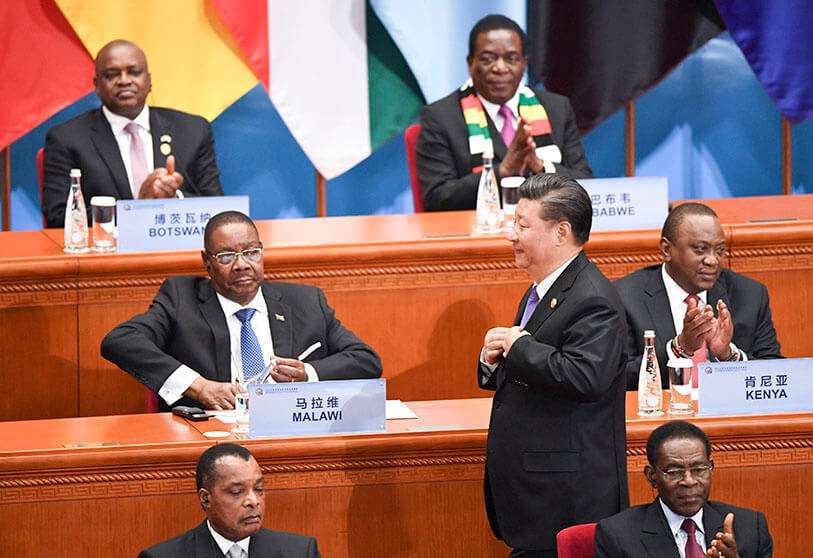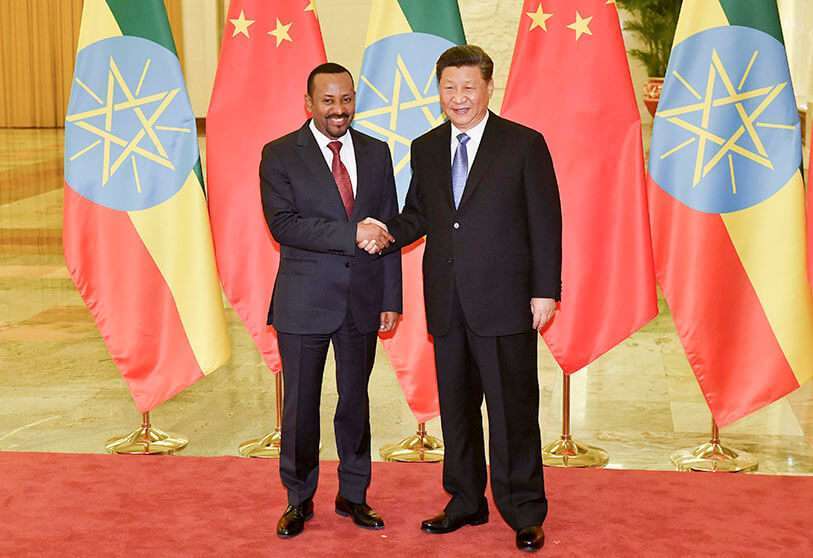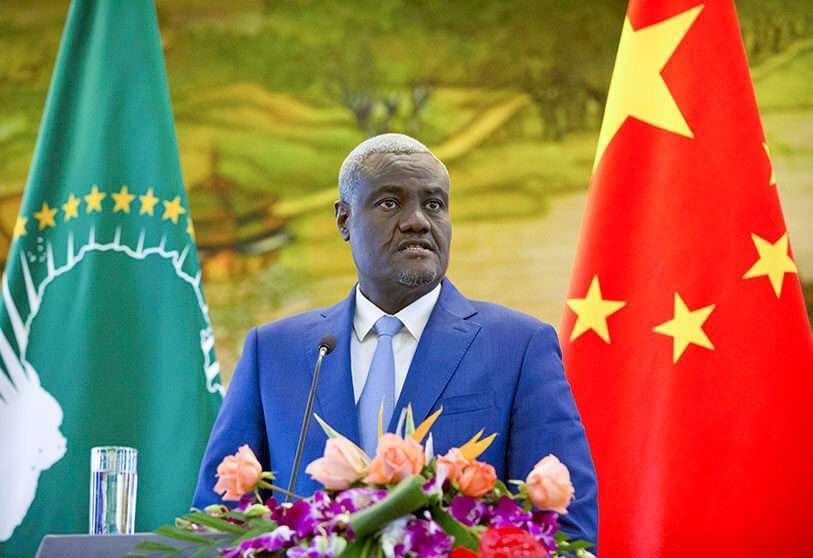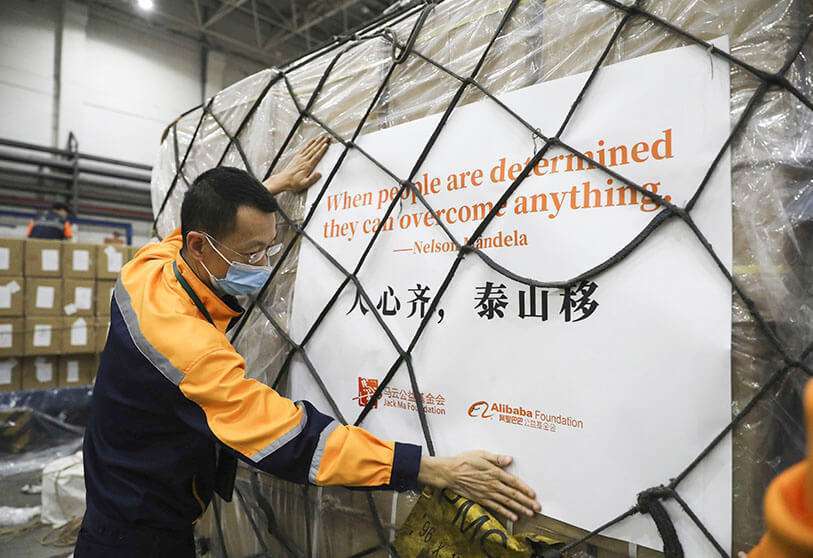Africa and China, an idyll under pressure

Nothing escapes the pandemic earthquake. Not even the idyllic relationship between Africa and China, which far from the usual mutual praise of their leaders, endures unusual tension under the shadow of the coronavirus.
Before the pandemic, the waters of Chinese-African relations flowed quietly through the valleys of international geopolitics, where Africa is an increasingly Chinese sphere of influence, to the detriment of the traditional hegemony of the United States and Europe. Beijing boasted of a "friendship against all odds" with the continent and brandished its rhetoric of "mutual benefit", while the African elite sang praises in the ear of the Asian giant, as when Zimbabwean President Robert Mugabe described Chinese President Xi Jinping in 2015 as a "God-sent person".
There was very little room for discord in that apparent idyll. Africa avoided any hint of criticism against its powerful ally and China not only set itself up as its first trading partner and main bilateral creditor, but also closed its eyes to any wrongdoing and acted as a sounding board for its complaints to the West. However, the pandemic has strained the "honeymoon" enjoyed by both blocs in recent months.

Alarms were raised in April, when videos of abused African citizens in China, who were fighting hard to break the outbreak of the coronavirus that originated there before it spread around the world, began running like wildfire on social networks. The images came from the southern city of Guangzhou, known as "Little Africa" for housing thousands of African immigrants, where authorities identified the continent as the source of numerous cases of imported coronavirus cases.
The Chinese population then feared that all Africans in the city were infected, and resentment and mistrust spread. "From now on, black people are not allowed to enter this restaurant," said a cartel from a McDonald's in Guangzhou in a viral video. Other images showed Africans on the streets after being evicted from homes and hotels for fear of the virus.

Labels such as "Racism in China" or "China must explain" flooded the social networks, a pressure that ended up shaking African chancelleries, some of which called for consultations with Chinese ambassadors. "No excuse can justify discrimination and prejudice," the Kenyan Foreign Ministry went so far as to denounce, while the chairman of the African Union (AU) Commission, Moussa Faki Mahamat, declared himself "extremely concerned".
As Kenyan columnist and expert in international relations Adhere Cavince told Efe, "nothing like this has ever happened before in the interaction between China and Africa", that is, a "diplomatic" crisis in which both blocks air their dirty laundry. "This may have created some friction in the relationship, but I don't think it's something that will fundamentally change the way Africa and China relate," Cavince points out.
Far from China, on the continent itself, the coronavirus has put the vulnerable health systems of its countries to the test, although, for the moment, the most pessimistic predictions, which almost doomed Africa to a kind of health apocalypse, have not come true.
So far, Africa remains the least affected region in the world, with more than 8,300 confirmed deaths, 316,000 infections and 152,000 cures out of a population of about 1.3 billion people, thanks to the swift action of African governments who, as soon as the wolf of the pandemic showed its face, implemented drastic measures to curb the disease.
The crisis has placed the continent facing a double challenge: to allocate resources to protect the health of its citizens and to minimize the economic impact of confinements, curfews and border closures imposed to contain the expansion of COVID-19. According to the World Bank (WB), the economies of sub-Saharan Africa will contract by 5.1% this year, a drop that puts the region on the verge of its first recession in a quarter of a century.
With that bleak outlook, several African leaders have expressed their concern that, in the words of Ethiopia's Prime Minister Abiy Ahmed, "African countries were spending more on debt repayment than on health care" last May. "In Africa, we are looking for help from developed countries, including China," said Abiy, the 2019 Nobel Peace Prize winner.

The G20 (group of the 20 most powerful economies in the world) gave the poorest countries, many of them in Africa, a break in April by announcing a moratorium on debt service payments until the end of 2020 (about $20 billion). China, a member of the G20, supported that measure, but without clarifying its intentions with respect to Africa as the continent's leading bilateral lender, which owes Beijing at least 152 billion dollars, according to data from John Hopkins University (USA). Beijing has provided these loans in the last decade as part of its Global Highway and Slot Initiative, which has allowed the construction of infrastructure across the continent and increased the international influence of the Asian giant.
After weeks of vague statements, the Chinese president gave a more concrete clue to his claims on Africa's debt on June 17 in a speech to African leaders during a virtual summit of bilateral solidarity on the pandemic. "Under the FOCAC (Forum on China-Africa Cooperation), China will cancel the debt of relevant African countries in the form of interest-free government loans maturing in late 2020," Xi said, without specifying the beneficiary nations.
The Chinese leader also did not mention that such loans covered less than five percent of the total from 2000 to 2018, according to a study by the China Africa Research Initiative (CARI), which is why their removal could be a mere drop in the ocean.
On the continent, there have been some very critical voices against Beijing, such as that of the former vice president for Africa of the World Bank and former Nigerian minister Obiageli Ezekwesili, who is demanding "complete cancellation" of the debt with China as "compensation" for the impact of the coronavirus. However, says Cavince, this idea "is not good in the long term, because it creates a narrative of a continent that cannot be responsible for its own contractual obligations".

In any case, "Africa's frustration with China's harsh positions on debt relief/ forgiveness could further damage the foundation of the relationship," Yun Sun, director of the China Program at the Stimson Center in Washington, warns Efe.
To combat these concerns, China has promoted so-called "mask diplomacy", as part of a campaign to show itself as a generous leader in global health capable of defeating the coronavirus, in the face of accusations from the United States, which blames Beijing for the worldwide spread of the COVID-19.
On May 31, South African President and African Union chief of staff Cyril Ramaphosa said China had pledged to send 80 million masks, 30 million screening tests and 10,000 ventilators to Africa each month to combat the pandemic. Xi has also promised that if China develops a vaccine against the disease, "African countries will be among the first to benefit.
"Perhaps China will emerge as a 'saviour of Africa' when the crisis subsides, although Europe and the US will also be watching," Patrick Mbataru, professor of public policy at Kenyatta University in Nairobi, told Efe.

In a post-COVID-19 scenario, Cavince believes that China's "priority" on the continent "will shift from large-scale infrastructure," which is promoted by the Beltway and Route Initiative, to "cooperation in public health systems.
Although some observers have been quick to declare the end of the Chinese-African "honeymoon" in light of the tensions experienced by the coronavirus, this expert believes it is "too soon" to consider the idyll broken. China and Africa," he concludes, "have not even reached the peak of their relationship, although there is a bump (...) accentuated by this pandemic" .









